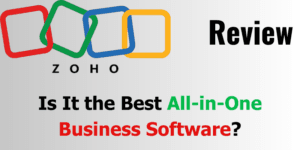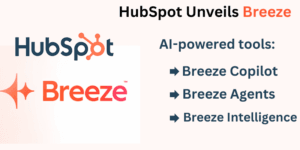Zoho CRM is one of the standout products within the Zoho suite. It is designed to help businesses manage customer relationships, automate sales processes, and enhance customer satisfaction. Zoho CRM works efficiently for small to medium-sized businesses. Its scalability ensures it can also handle the needs of growing enterprises.
Zoho CRM: Everything your business needs,with a neat 360° view.
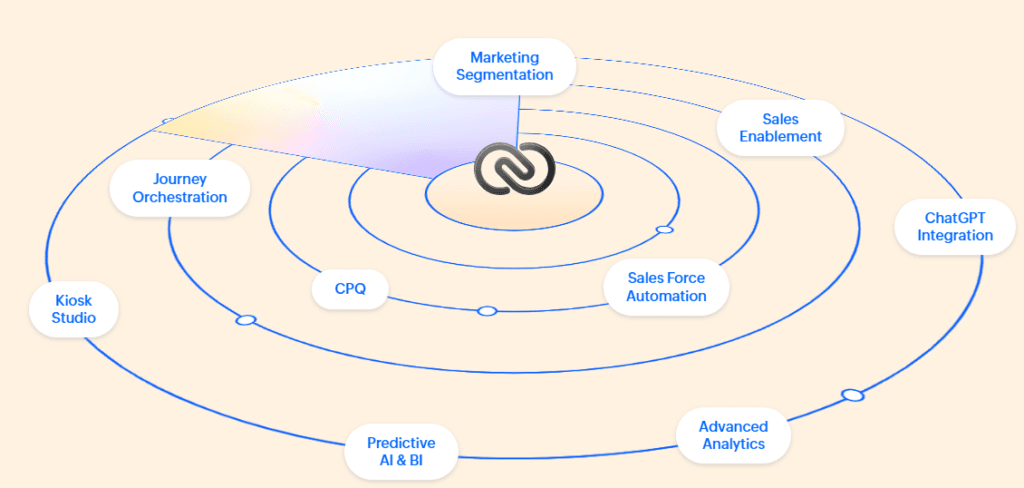
Table of Contents
Real-life success stories of how companies have streamlined operations across multiple departments using Zoho CRM:
1. Improved Team Collaboration (Sales, Marketing, Customer Support)
- Zoho CRM integrates sales, marketing, and customer service departments by offering shared access to customer data. All teams work off the same information, which enhances collaboration and reduces duplication of tasks.
- Example: Case Study – Indian Roots, a fashion e-commerce company, improved collaboration between sales and marketing teams. Sales could see marketing campaigns and customer interactions, enabling them to personalize their follow-ups.
- ROI Impact: This led to a 30% reduction in lead conversion time and a 20% increase in customer satisfaction. Without Zoho, teams would have struggled with fragmented information, leading to miscommunication and delays.
2. Centralized Customer Information (Sales and Customer Support)
- Zoho CRM stores all customer information in one place, making it easier for the sales and customer service teams to track interactions and provide better service.
- Example: Tata Play, a digital television service provider, used Zoho CRM to track customer inquiries and issues. By having a 360-degree view of customer history, support agents were able to resolve issues faster and with more precision.
- ROI Impact: This helped the company reduce response times by 40%, improving customer retention. Without a centralized CRM tool like Zoho, resolving customer issues would have been slower and more frustrating for both agents and customers.
4. Automated Lead Scoring and Management (Sales)
- Zoho CRM automates the lead scoring process, enabling sales teams to focus on high-quality leads. It prioritizes leads based on predefined criteria, such as engagement level and demographics.
- Example: Capillary Technologies, a SaaS company, used Zoho CRM’s automated lead scoring to target their sales efforts more efficiently, reducing the time spent on unqualified leads.
- ROI Impact: Their sales conversion rate increased by 25%. Without Zoho CRM, the sales team would have spent valuable time on leads that were unlikely to convert, reducing overall efficiency.


5. Enhanced Customer Segmentation and Marketing Personalization (Marketing)
- Marketing teams use Zoho CRM to segment customers based on their buying behavior, geography, or previous interactions, enabling highly personalized campaigns.
- Example: KPMG, a global consulting firm, leveraged Zoho CRM to segment its clients and send targeted marketing messages, leading to more relevant and effective campaigns.
- ROI Impact: Their targeted campaigns increased email open rates by 35% and generated a 20% increase in sales opportunities. Without CRM, managing customer data manually for segmentation and personalization would have been time-consuming and less effective.
6. Automated Workflow for Customer Service (Customer Support)
- Zoho CRM allows the automation of repetitive customer service tasks such as sending follow-up emails or generating support tickets, streamlining service workflows.
- Example: Emerson Electric, a manufacturing company, automated its support ticketing process using Zoho CRM, which improved its response time and decreased customer complaints.
- ROI Impact: This led to a 50% reduction in ticket resolution times and a 15% improvement in customer satisfaction. Without Zoho CRM, managing support requests manually would have caused delays and lower service quality.
7. Real-time Reporting and Analytics (Management and Sales)
- Management teams use Zoho CRM’s reporting tools to generate real-time analytics on sales performance, customer behavior, and campaign effectiveness. This enables quick decision-making.
- Example: Lenskart, an eyewear retailer, used Zoho CRM’s real-time dashboards to track sales team performance, identifying areas that needed improvement.
- ROI Impact: By making data-driven decisions, the company saw a 20% improvement in sales performance. Without the CRM tool, extracting and analyzing performance metrics manually would have been cumbersome and error-prone.
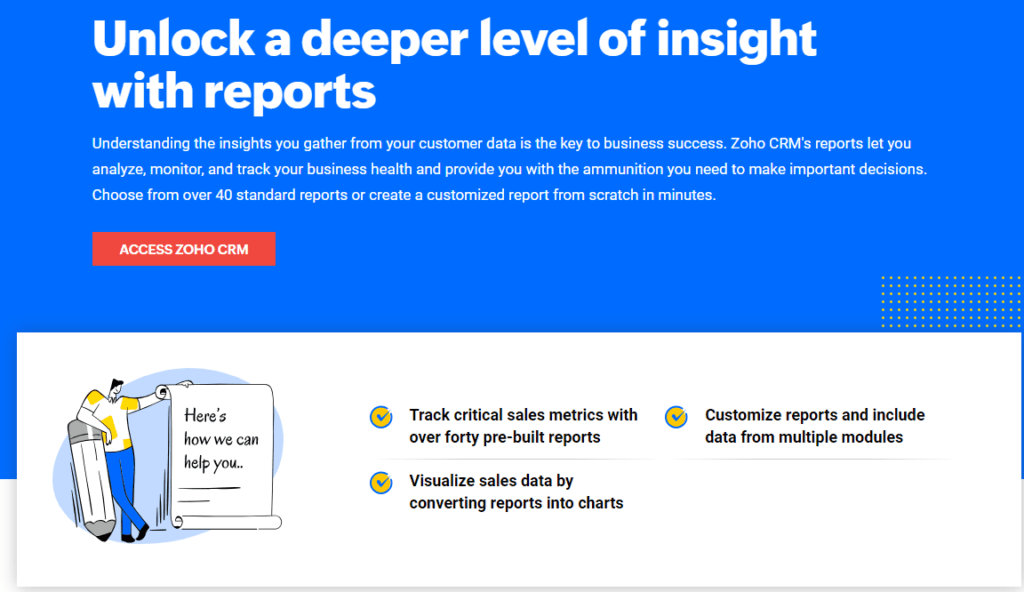
8. Enhanced Customer Retention (Customer Support and Sales)
- By offering better customer service and personalized follow-ups, Zoho CRM helps teams enhance customer retention and loyalty.
- Example: Mahindra, a multinational conglomerate, used Zoho CRM to track customer feedback and follow up on satisfaction surveys, improving customer loyalty.
- ROI Impact: The company increased its customer retention rate by 15%, which had a significant positive impact on its long-term revenue. Without Zoho CRM, managing feedback and tracking follow-ups would have been difficult, leading to a lower retention rate.
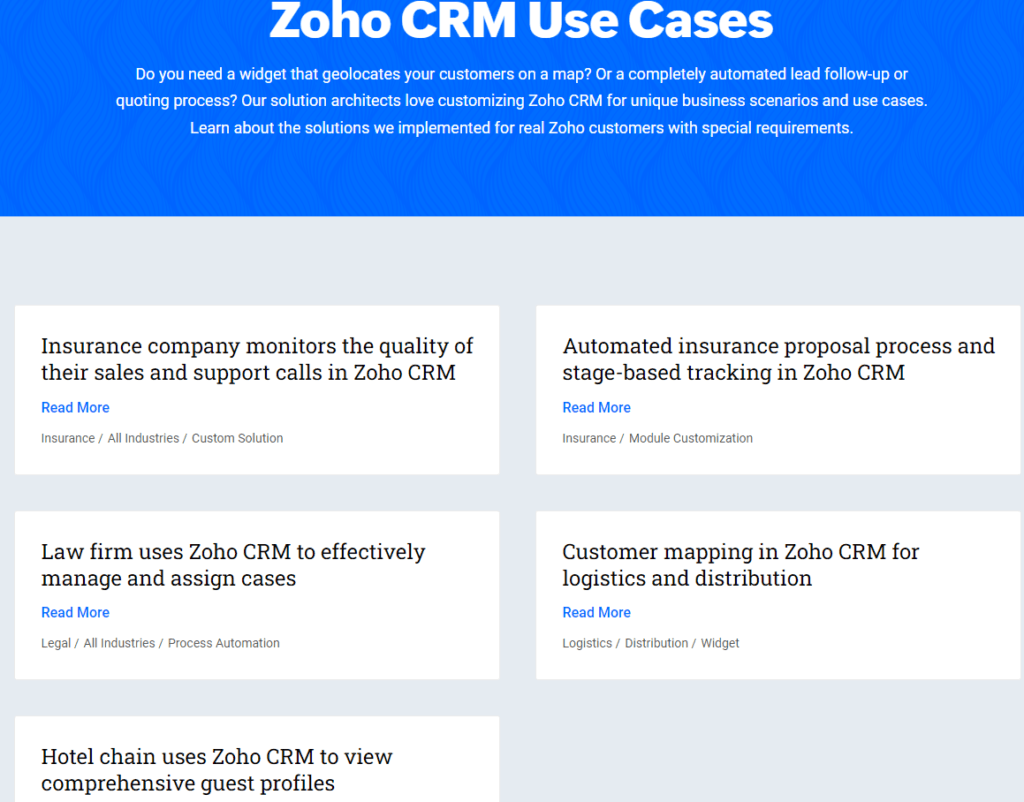
Zoho CRM Pricing and Plans
Zoho offers a variety of pricing tiers, making it accessible to businesses of all sizes. Below is a breakdown of its most popular plans:

- Free Plan: Zoho offers a limited free version for some of its tools, including Zoho CRM. While it’s suitable for startups and small teams, it lacks advanced features such as custom reports and automation.
- Standard Plans: For Zoho CRM, standard pricing starts around $12 per user per month. This tier typically includes basic automation, customer support features, and core functionality.
- Professional Plans: Zoho CRM Professional pricing starts around $20 per user per month.
- Enterprise Plans: Zoho’s CRM enterprise-level plans start around $35 per user per month.
- Ultimate Plans: Larger businesses can benefit from Zoho CRM Ultimate plans. These plans offer advanced automation, deeper customization, and enhanced reporting. The plans start around $45 per user per month.
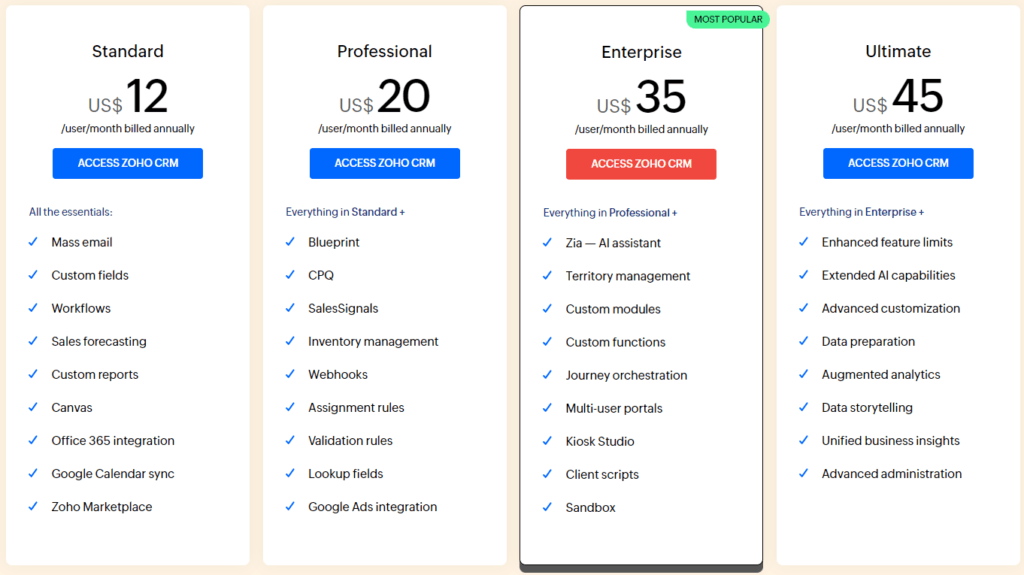
Conclusion:
Using Zoho CRM, companies like Indian Roots, Tata Play, KPMG, and Lenskart have streamlined their operations across multiple departments, including sales, marketing, customer support, and management. These organizations have seen substantial improvements in ROI due to better team collaboration, centralized customer data, automated workflows, and real-time analytics.
Without Zoho CRM, these achievements would have been difficult, if not impossible, to accomplish due to disorganized information, manual processes, and limited visibility into customer interactions. The CRM tool plays a crucial role in fostering better customer relationships, improving team efficiency, and ultimately driving business growth.




